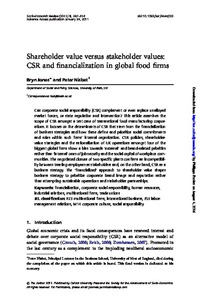Shareholder value versus stakeholder values: CSR and financialization in global food firms

2011
9
2
April
286-314
business strategy ; corporate social responsibility ; food industry ; labour relations ; multinational enterprise ; financialisation
Business economics
English
Bibliogr.
"Can corporate social responsibility (CSR) complement or even replace unalloyed market forces, or state regulation and intervention? This article examines the scope of CSR amongst a test case of transnational food manufacturing corporations. It focuses on the determinants of CSR that stem from the financialization of business strategies and how these define and prioritize social commitments and roles within such firms' internal organization. CSR policies, shareholder-value strategies and the rationalization of UK operations amongst four of the biggest global firms show a bias towards ‘external' and brand-related priorities rather than ‘internal' ones of job security and the social capital of workplace communities. The negotiated closure of two specific plants confirms an incompatibility between treating employees as stakeholders and, on the other hand, CSR as a business strategy. The ‘financialized' approach to shareholder value shapes business strategy to prioritize corporate brand image and reputation rather than attempting sustainable operations and stakeholder partnerships. "
Digital
The ETUI is co-funded by the European Union. Views and opinions expressed are however those of the author(s) only and do not necessarily reflect those of the European Union or the ETUI.